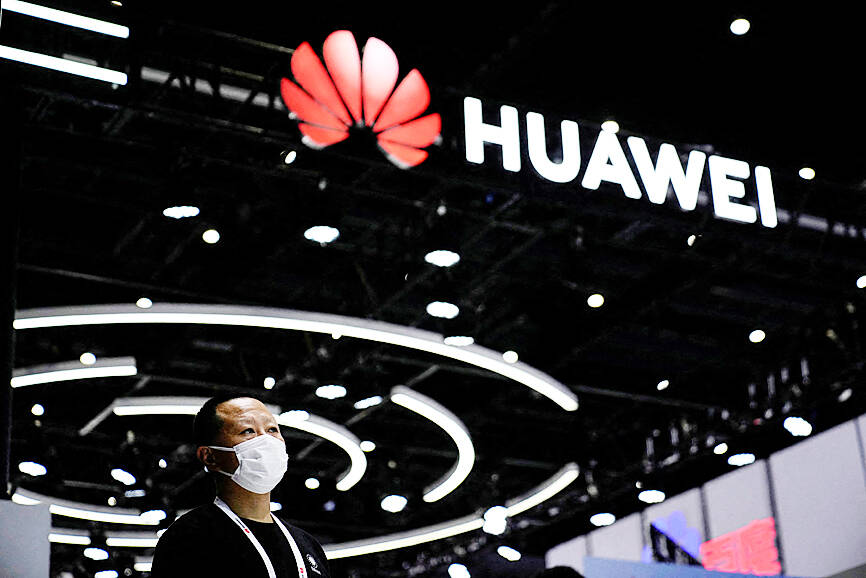Huawei Technologies Co (華為) has secured an extension to a patent licensing deal with Nokia Oyj, suggesting the Chinese company continues to lead in networking technology, despite years of punishing US sanctions.
The announcement indicates appetite for access to Huawei’s next-generation telecom patents remains strong, despite US accusations the Chinese giant poses a threat to national security. Huawei did not disclose details of the deal, saying the terms are confidential.
Huawei is trying to open up new markets and businesses, after US tech export restrictions gutted its smartphone business and curtailed the sale of advanced gear in developed markets. In response, it has begun levying royalties on the world’s biggest smartphone brands, including Apple Inc and Samsung Electronics Co, after first announcing plans to broaden its licensing business from last year.

Photo: Reuters
Huawei has signed more than 20 patent license agreements this year, covering smartphones, connected vehicles, networking and the Internet of Things, Huawei global head of IP Alan Fan said.
“In the automotive industry alone, we reached deals with around 15 car makers for use of our advanced wireless technologies, including well-known names such as Audi, Mercedes Benz, BMW, Porsche, Renault, Suzuki, Lamborghini, Subaru and Bentley,” he said in a prepared statement.
Intellectual property collaborations are among the few areas Huawei can still make significant headway in developed markets like Europe.
The UK has decided to remove the Chinese company from its 5G networks by 2027, though there has been a recent delay in certain specific restrictions.
A senior EU official last month urged countries like Germany to stop using high-risk 5G suppliers, without naming Huawei.
A series of export bans imposed during the administration of former US president Donald Trump barred Huawei from accessing an array of critical US technologies, curtailing its ability to make advanced products from smartphones to servers. That campaign against China’s tech giants expanded during US President Joe Biden’s administration, which also took aim at Chinese-made semiconductors.
Huawei’s net profit fell 40 percent in the first three quarters, although it spent heavily on research to safeguard its lead in 5G networking.
Huawei remains the biggest holder of patents in ultra-fast broadband technology, which is rapidly becoming the mainstream for mobile users around the world.
It is also seeking alternative sources of income by selling artificial intelligence and wireless communications gear to less-traditional customers from automakers to coal mines and industrial parks.

UNCERTAINTY: Innolux activated a stringent supply chain management mechanism, as it did during the COVID-19 pandemic, to ensure optimal inventory levels for customers Flat-panel display makers AUO Corp (友達) and Innolux Corp (群創) yesterday said that about 12 to 20 percent of their display business is at risk of potential US tariffs and that they would relocate production or shipment destinations to mitigate the levies’ effects. US tariffs would have a direct impact of US$200 million on AUO’s revenue, company chairman Paul Peng (彭雙浪) told reporters on the sidelines of the Touch Taiwan trade show in Taipei yesterday. That would make up about 12 percent of the company’s overall revenue. To cope with the tariff uncertainty, AUO plans to allocate its production to manufacturing facilities in

Taiwan will prioritize the development of silicon photonics by taking advantage of its strength in the semiconductor industry to build another shield to protect the local economy, National Development Council (NDC) Minister Paul Liu (劉鏡清) said yesterday. Speaking at a meeting of the legislature’s Economics Committee, Liu said Taiwan already has the artificial intelligence (AI) industry as a shield, after the semiconductor industry, to safeguard the country, and is looking at new unique fields to build more economic shields. While Taiwan will further strengthen its existing shields, over the longer term, the country is determined to focus on such potential segments as

TAKING STOCK: A Taiwanese cookware firm in Vietnam urged customers to assess inventory or place orders early so shipments can reach the US while tariffs are paused Taiwanese businesses in Vietnam are exploring alternatives after the White House imposed a 46 percent import duty on Vietnamese goods, following US President Donald Trump’s announcement of “reciprocal” tariffs on the US’ trading partners. Lo Shih-liang (羅世良), chairman of Brico Industry Co (裕茂工業), a Taiwanese company that manufactures cast iron cookware and stove components in Vietnam, said that more than 40 percent of his business was tied to the US market, describing the constant US policy shifts as an emotional roller coaster. “I work during the day and stay up all night watching the news. I’ve been following US news until 3am

COLLABORATION: Given Taiwan’s key position in global supply chains, the US firm is discussing strategies with local partners and clients to deal with global uncertainties Advanced Micro Devices Inc (AMD) yesterday said it is meeting with local ecosystem partners, including Taiwan Semiconductor Manufacturing Co (TSMC, 台積電), to discuss strategies, including long-term manufacturing, to navigate uncertainties such as US tariffs, as Taiwan occupies an important position in global supply chains. AMD chief executive officer Lisa Su (蘇姿丰) told reporters that Taiwan is an important part of the chip designer’s ecosystem and she is discussing with partners and customers in Taiwan to forge strong collaborations on different areas during this critical period. AMD has just become the first artificial-intelligence (AI) server chip customer of TSMC to utilize its advanced